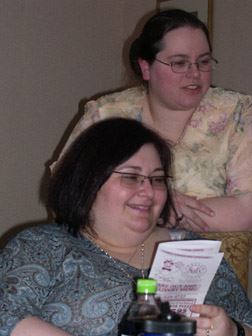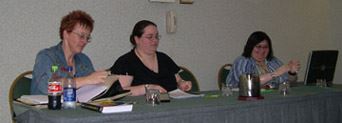

 It’s hard to believe that 2009 will mark my eleventh trip to the International Conference on the Fantastic in the Arts (ICFA). In 1998, a friend from graduate school told me about the conference and suggested I submit a proposal. I took her advice and put together a proposal about authorship and control of narrative scripting in Dark City and The Truman Show. While I was working on the proposal, I had no idea how much its acceptance and my first trip to this conference would impact my academic and personal lives.
It’s hard to believe that 2009 will mark my eleventh trip to the International Conference on the Fantastic in the Arts (ICFA). In 1998, a friend from graduate school told me about the conference and suggested I submit a proposal. I took her advice and put together a proposal about authorship and control of narrative scripting in Dark City and The Truman Show. While I was working on the proposal, I had no idea how much its acceptance and my first trip to this conference would impact my academic and personal lives.
Throughout my academic career, I have always been associated with departments that were very traditional in terms of canon, theory, and philosophical approaches to texts. While I never had a problem finding people willing to engage with me about texts like Paradise Lost or “My Last Duchess,” “Araby” or “Hills Like White Elephants,” the same could not be said when it came to discussions of “genre fiction.” Even works like The Chronicles of Narnia and The Lord of the Rings were viewed with suspicion and often mild contempt. In fact, one of my professors in graduate school, someone who helped me grow as a teacher and a writer, once compared reading genre fiction to eating Twinkies: they are both things you cannot resist sneaking a nibble of every now and then, even though you know they have no nutritional value and will rot your teeth.
That attitude contributed to my becoming a stealth student of the fantastic. I stuck fiercely to those “literary” texts with fantastical elements that had been, more or less, embraced by the academy. After all, the tools I learned to study them could easily be applied to other sorts of texts, couldn’t they? I did not talk to colleagues about the fantasy texts I was reading with more enthusiasm and interest than I had David Copperfield or The Great Gatsby. I certainly did not confess that I skipped a two-hour PBS documentary on Emily Dickinson that had the department all atwitter so that I could watch the series premiere of Star Trek: The Next Generation. In essence, I learned to build a wall between texts that were approved for academic discussion and discourse and those that inspired passion and pleasure.
The thing I remember most clearly about my first ICFA was the feeling of excitement that there were other people, lots of other people, who were interested in studying and producing the sorts of texts that most inspired me. It is th
is sort of creative and intellectual energy that keeps me coming back to the conference year after year. It has led to collaborations with other attendees on articles and fiction, opportunities for publication, and a growing circle of colleagues and very dear friends whose acquaintance has enriched my scholarship, my fiction writing, and my personal life. It means that I come back from Florida each spring physically exhausted but creatively energized.
Although I’ve attended many spectacular paper sessions and discussion panels, some of my strongest memories of ICFA sessions focus on author readings. I remember Peter Straub looking deceptively cherubic and slyly gleeful as he read the grisly first chapter of Black House. I remember being moved to tears when Molly Gloss read “Lambing Season,” a powerful story about a sheepherder and the alien she discovers while tending her flock. I remember Neil Gaiman reading a tale of the Chinese emperor obsessed with creating the perfect map of the kingdom that he begins neglecting as he focuses more on the idea of capturing it than nurturing it. However, I also remember particularly delightful and inspiring luncheon presentations by conference guests like Nina
Auerbach, Octavia Butler, and Roderick McGillis (even though the last
one was interrupted several times by an errant fire alarm).

However, it isn’t just the official conference programming that keeps me (and I would imagine many other attendees) coming back year after year. The informal and often impromptu gatherings in rooms and restaurants, in lounges and at poolside, are just as much a part of the ICFA experience for me. This past year’s trip to Universal Studios and nocturnal poolside gatherings to sample perfume oils from Blooddrop (and look for alligators in the lake behind the hotel) were the newest of a long list of conference memories. If I mentioned by name all those who helped me make them, I would end up writing a small chapbook instead of an essay. It was the place where I first met Joe Sanders (our Shadetree Scholar), this despite the fact we were both teaching at the same school, and it is largely thanks to him that my involvement with the conference increased.
As the first proposals for ICFA 30 trickle into my Inbox, that first conference seems a long time ago. I presented a single paper, attended many author readings, panels, paper sessions, and other conference events. Over the next few years, I began chairing paper sessions, participating in panel discussions, and organizing paper sessions and panels. In 2006 when the Popular Culture and Visual Arts (PCVA) Division was divided into the Visual and Performing Arts (VPA) and Community and Culture (CC) Divisions, I was honored to be invited to head the Community and Culture in the Fantastic Division. Over the last two years, I have been delighted with the reception that the Division has received in terms of the scholars who are presenting in it, the attendance at sessions and panels, and the lively debate and dialogue that occurs in the sessions and panels. Part of the core group of scholars in that division are currently forming the International Association for Audience and Fan Studies (IAAFS).
Eleven years ago, if you had asked me what I was going to be doing at ICFA, I would have said, “Presenting a paper and attending paper sessions and readings.” While that is still what I do at the conference, it is now an unsatisfying answer, because it does not take into account what the conference has come to mean to me. It is a part of my spring as surely as the natural changes that mark the turning of the seasons. It is a time for me to get excited all over again about what I study and what I write and to spend time with friends and colleagues who have enriched my scholarship and my life.
--Barbara Lucas